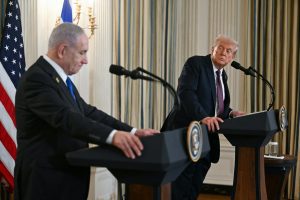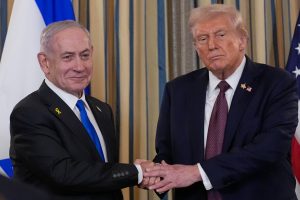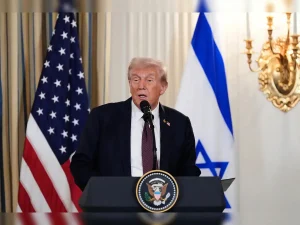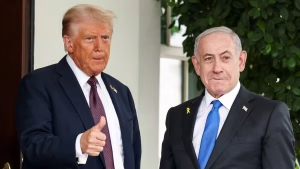Washington D.C. – The unveiling of a new peace initiative by former US President Donald Trump has stirred global attention, particularly because of its implications for Hamas and Gaza’s future. The plan seeks to end the ongoing two-year-long conflict, introduce a new governing structure in Gaza, and chart a path toward stability. However, the most debated element remains the position of Hamas On Trump’s Gaza Plan, as the group currently controls Gaza and its future role is central to any potential peace framework.
Key Highlights of Trump’s Gaza Proposal

Trump’s peace plan outlines a multi-layered approach aimed at halting the conflict and ensuring long-term governance changes in Gaza. According to the proposal, Hamas will have no role in the future administration of the territory. Instead, governance will shift to a new Palestinian authority free from militant control. The plan mandates an immediate ceasefire, Israeli withdrawal, and disarmament of Hamas fighters as the primary conditions. The inclusion of these conditions has made discussions around Hamas On Trump’s Gaza Plan highly contentious.
Amnesty for Hamas Members


One of the most striking provisions is the offer of amnesty to Hamas members. The plan states that those who agree to peaceful coexistence and disarmament will be pardoned. Furthermore, individuals unwilling to remain in Gaza under the new structure will be granted safe passage to other countries. This aspect of Hamas On Trump’s Gaza Plan is framed as a way to prevent retaliation and promote rehabilitation, yet critics argue that it softens accountability for past violence.
Hostage Release Clause


A vital component of the proposal addresses hostages currently held in Gaza. Trump’s plan specifies that within 72 hours of Israel’s acceptance, all hostages must be released. This provision adds pressure on Hamas, tying their compliance directly to humanitarian expectations. Analysts note that this clause reflects the international priority of freeing captives while assessing the feasibility of Hamas On Trump’s Gaza Plan.
Reaction From Hamas Leadership
In response, Hamas negotiators informed mediators from Qatar and Egypt that they are reviewing the plan “in good faith.” While this signals openness to dialogue, no official acceptance or rejection has yet been declared. For observers, this cautious reaction underscores the delicate balance Hamas faces in addressing internal expectations while considering external diplomatic pressure. Their measured response has amplified global interest in the evolving stance of Hamas On Trump’s Gaza Plan.
Support From Israel and Regional Mediators

The proposal has received backing from Israeli Prime Minister Benjamin Netanyahu, who has long demanded Hamas disarmament as a precondition for peace. Regional mediators from Qatar and Egypt quickly engaged Hamas with the plan, indicating an urgent push for progress. The active involvement of neighboring powers adds legitimacy to the framework, though questions remain about how enforceable the terms of Hamas On Trump’s Gaza Plan truly are in practice.
Potential Challenges Ahead
Experts warn that implementing the plan will face significant obstacles. Hamas disarmament has historically been resisted due to its identity as both a political and military organization. Additionally, granting amnesty may create divisions within Gaza, where some demand accountability. These factors contribute to skepticism about whether Hamas On Trump’s Gaza Plan can be realistically executed or if it will face the same fate as earlier unfulfilled peace initiatives.
Humanitarian and Political Implications
For Gaza’s civilians, the plan offers hope for stability after years of violence. An Israeli withdrawal, paired with promises of governance reform, could reduce suffering if realized. However, doubts persist over whether humanitarian relief can be decoupled from political agendas. The humanitarian narrative has become central to discussions on Hamas On Trump’s Gaza Plan, as ordinary people remain the most affected by any delay or failure in its implementation.
Global Reactions and Outlook
Global leaders are closely watching the evolving situation. Supporters of the plan view it as a chance to reset relations and move toward peace. Critics argue that excluding Hamas entirely from governance may destabilize Gaza further. The international debate emphasizes that the success of Hamas On Trump’s Gaza Plan depends on compromise, enforcement, and genuine commitment by all sides. Ultimately, the world is waiting for Hamas to issue a conclusive stance.
Conclusion
The introduction of Trump’s proposal has reignited the international focus on Gaza, particularly the response of Hamas. By offering amnesty, safe passage, and a chance for rehabilitation, the plan aims to neutralize conflict drivers while reshaping governance. Yet, the group’s cautious review highlights uncertainty and the challenges that remain. The fate of Hamas On Trump’s Gaza Plan will not only determine the trajectory of peace in Gaza but also influence the broader stability of the region.

